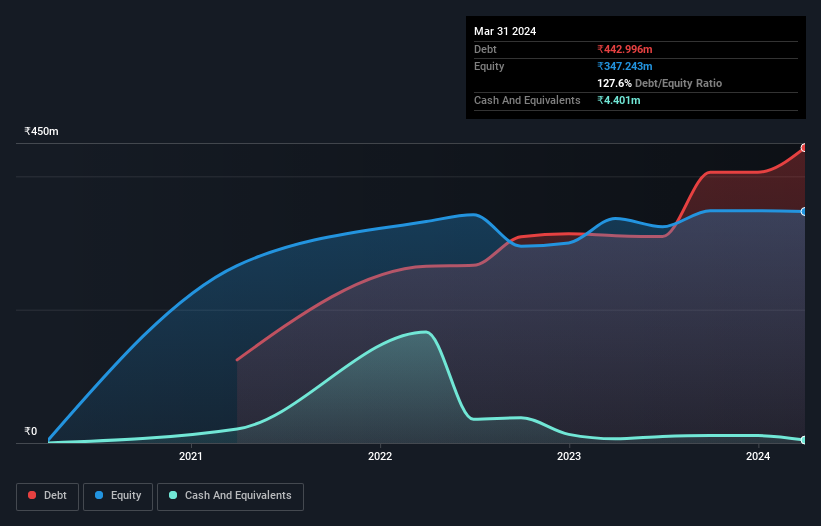Vineet Laboratories (NSE:VINEETLAB) Seems To Be Using A Lot Of Debt
Some say volatility, rather than debt, is the best way to think about risk as an investor, but Warren Buffett famously said that 'Volatility is far from synonymous with risk.' When we think about how risky a company is, we always like to look at its use of debt, since debt overload can lead to ruin. We can see that Vineet Laboratories Limited (NSE:VINEETLAB) does use debt in its business. But the real question is whether this debt is making the company risky.
Why Does Debt Bring Risk?
Generally speaking, debt only becomes a real problem when a company can't easily pay it off, either by raising capital or with its own cash flow. In the worst case scenario, a company can go bankrupt if it cannot pay its creditors. However, a more frequent (but still costly) occurrence is where a company must issue shares at bargain-basement prices, permanently diluting shareholders, just to shore up its balance sheet. Of course, plenty of companies use debt to fund growth, without any negative consequences. The first step when considering a company's debt levels is to consider its cash and debt together.
View our latest analysis for Vineet Laboratories
What Is Vineet Laboratories's Debt?
As you can see below, at the end of March 2024, Vineet Laboratories had ₹443.0m of debt, up from ₹310.9m a year ago. Click the image for more detail. And it doesn't have much cash, so its net debt is about the same.

How Strong Is Vineet Laboratories' Balance Sheet?
The latest balance sheet data shows that Vineet Laboratories had liabilities of ₹760.0m due within a year, and liabilities of ₹61.5m falling due after that. Offsetting this, it had ₹4.40m in cash and ₹316.6m in receivables that were due within 12 months. So its liabilities total ₹500.5m more than the combination of its cash and short-term receivables.
This is a mountain of leverage relative to its market capitalization of ₹599.3m. Should its lenders demand that it shore up the balance sheet, shareholders would likely face severe dilution.
In order to size up a company's debt relative to its earnings, we calculate its net debt divided by its earnings before interest, tax, depreciation, and amortization (EBITDA) and its earnings before interest and tax (EBIT) divided by its interest expense (its interest cover). This way, we consider both the absolute quantum of the debt, as well as the interest rates paid on it.
Weak interest cover of 0.98 times and a disturbingly high net debt to EBITDA ratio of 6.2 hit our confidence in Vineet Laboratories like a one-two punch to the gut. This means we'd consider it to have a heavy debt load. Another concern for investors might be that Vineet Laboratories's EBIT fell 17% in the last year. If things keep going like that, handling the debt will about as easy as bundling an angry house cat into its travel box. There's no doubt that we learn most about debt from the balance sheet. But it is Vineet Laboratories's earnings that will influence how the balance sheet holds up in the future. So when considering debt, it's definitely worth looking at the earnings trend. Click here for an interactive snapshot.
Finally, a company can only pay off debt with cold hard cash, not accounting profits. So it's worth checking how much of that EBIT is backed by free cash flow. During the last three years, Vineet Laboratories burned a lot of cash. While that may be a result of expenditure for growth, it does make the debt far more risky.
Our View
To be frank both Vineet Laboratories's interest cover and its track record of converting EBIT to free cash flow make us rather uncomfortable with its debt levels. And even its EBIT growth rate fails to inspire much confidence. After considering the datapoints discussed, we think Vineet Laboratories has too much debt. That sort of riskiness is ok for some, but it certainly doesn't float our boat. When analysing debt levels, the balance sheet is the obvious place to start. However, not all investment risk resides within the balance sheet - far from it. Be aware that Vineet Laboratories is showing 3 warning signs in our investment analysis , and 2 of those shouldn't be ignored...
If, after all that, you're more interested in a fast growing company with a rock-solid balance sheet, then check out our list of net cash growth stocks without delay.
New: Manage All Your Stock Portfolios in One Place
We've created the ultimate portfolio companion for stock investors, and it's free.
• Connect an unlimited number of Portfolios and see your total in one currency
• Be alerted to new Warning Signs or Risks via email or mobile
• Track the Fair Value of your stocks
Have feedback on this article? Concerned about the content? Get in touch with us directly. Alternatively, email editorial-team (at) simplywallst.com.
This article by Simply Wall St is general in nature. We provide commentary based on historical data and analyst forecasts only using an unbiased methodology and our articles are not intended to be financial advice. It does not constitute a recommendation to buy or sell any stock, and does not take account of your objectives, or your financial situation. We aim to bring you long-term focused analysis driven by fundamental data. Note that our analysis may not factor in the latest price-sensitive company announcements or qualitative material. Simply Wall St has no position in any stocks mentioned.
Have feedback on this article? Concerned about the content? Get in touch with us directly. Alternatively, email editorial-team@simplywallst.com
About NSEI:VINEETLAB
Vineet Laboratories
Engages in the research, development, manufacture, and sale of active pharmaceutical ingredients (API), intermediates, and fine chemicals primarily in India.
Good value with mediocre balance sheet.
Market Insights
Community Narratives



